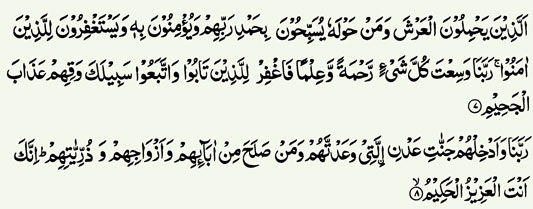
 |
||
40:7 Those who bear the Throne of Power and those who are round about it glorify with praises of their Rabb, and they believe in Him, and they ask forgiveness for those who believe: “Our Rabb! You embrace all things in mercy and knowledge. Therefore forgive those who turn, and who follow Your way, and save them from the chastisement of the fierce Fire. 40:8 “Our Rabb! and make them enter the Gardens of Eden, which You have promised them, and those who do good from among their parents and their spouses and their offspring. Certainly You Yourselves are Exalted in Might, most Wise. 40:7 Regarding interpretation of ‘arsh see 7:54; 10:3; 13:2; 20:5; 25:59; 32:4; 57:4. Several classical commentators expressed the term ‘arsh is a metonym for absolute dominion of Allāh (Rāghib, Rāzī, Baydāwi). The clause those who are round about it is customarily understood to include only the angles (39:75; 69:17), who are glorifying Allāh and carrying out His commands. However, in this instance the portrayal would also include human beings, who, by virtue of being representative of Allāh on the earth (cf. 2:30; 6:165; 27:62; 35:39), are morally obligated to declare the oneness of God and carry out His commands. The verse teaches a noble supplication with which believers are encouraged to pray for the benediction of fellow believers who turn to Allāh and follow His path shown in the Qur’ān. Additionally the believers are encouraged to make petition to save fellow believers from the chastisement of fire. It is true Allāh will judge each person’s case based on individual merit, but at the same time the Qur’ān is not precluding believers from praying for their fellow believers, particularly for relatives, during their lifetime and after they are dead. 40:8 The equity of recompense is gracefully stressed in this verse with clear reference of three groups of people identified through common gender: parents, spouses and offspring (13:23). Here the Qur’ān purposely avoided gender constraints, while at other instances it even spelled out each members of the gender to eliminate any doubt about equitable recompense (4:124; 13:23; 33:35; 40:40; 57:12). The word zawj is used in the Qur’ān to indicate spouse – male or female. |
||
